Overclockers UK Evolution Envy Mini Gaming PC Review
John Williamson / 9 years ago
A Closer Look
The chassis’ top panel is permanently fixed by design and Phanteks doesn’t expect the end-user to remove it. This is because the fan mounts are on a separate sliding mechanism which makes it relatively straightforward to attach a radiator in such a confined space. This is certainly an interesting decision and helps during the install process. The case also features a smooth power button on the top and ample supply of vents to improve airflow.
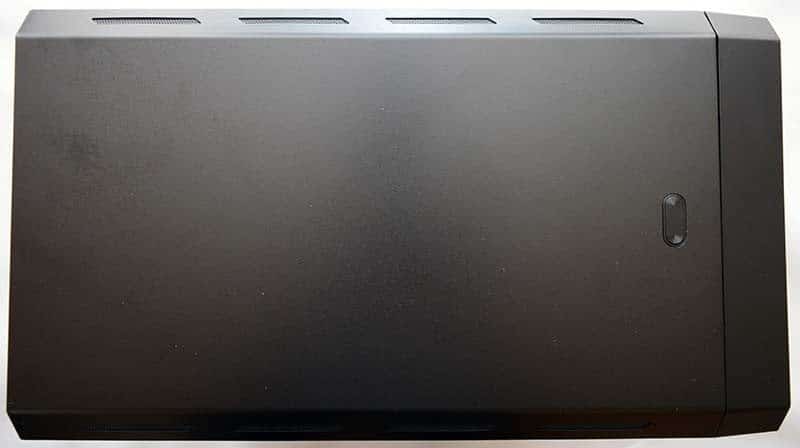
Moving onto the rear, we can see the case’s thumbscrews, rear 140mm Bitfenix Spectre Pro with a green LED hue, and other integral system components. The IO shield, power supply and graphics card are held perfectly in position and the rear fan’s central position seems a sensible choice given the airflow direction. 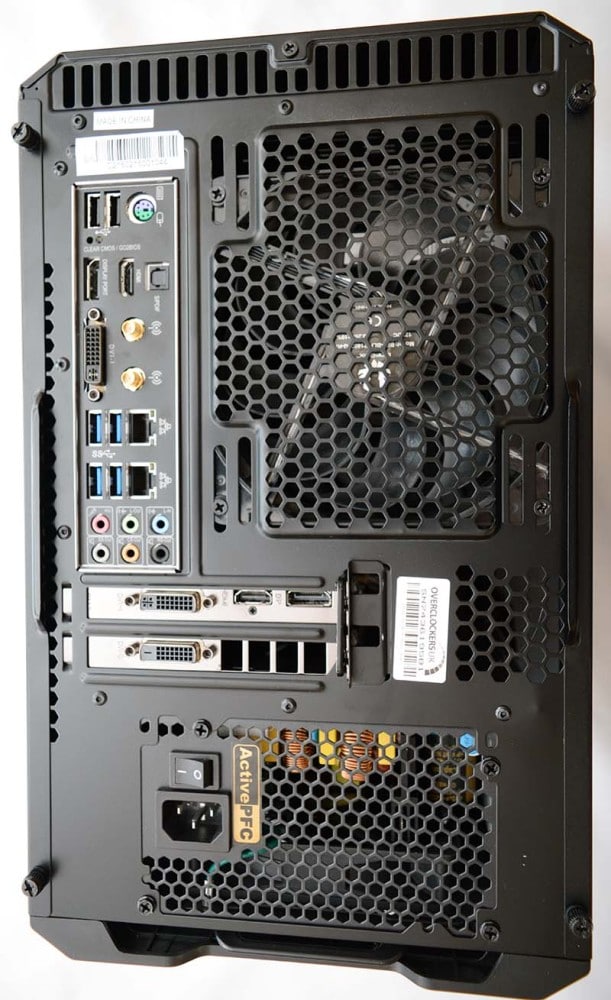
The front of the case is constructed from plastic unlike the larger ATX versions but feels solid enough and integrates two USB 3.0 ports, a tiny reset switch and headphone/microphone 3.5mm jacks. These are easily accessible and the reset switch is the correct size to avoid accidental presses when inserting a USB stick. There is a subtle white LED line when the system is powered on which makes for a sophisticated aesthetic style.
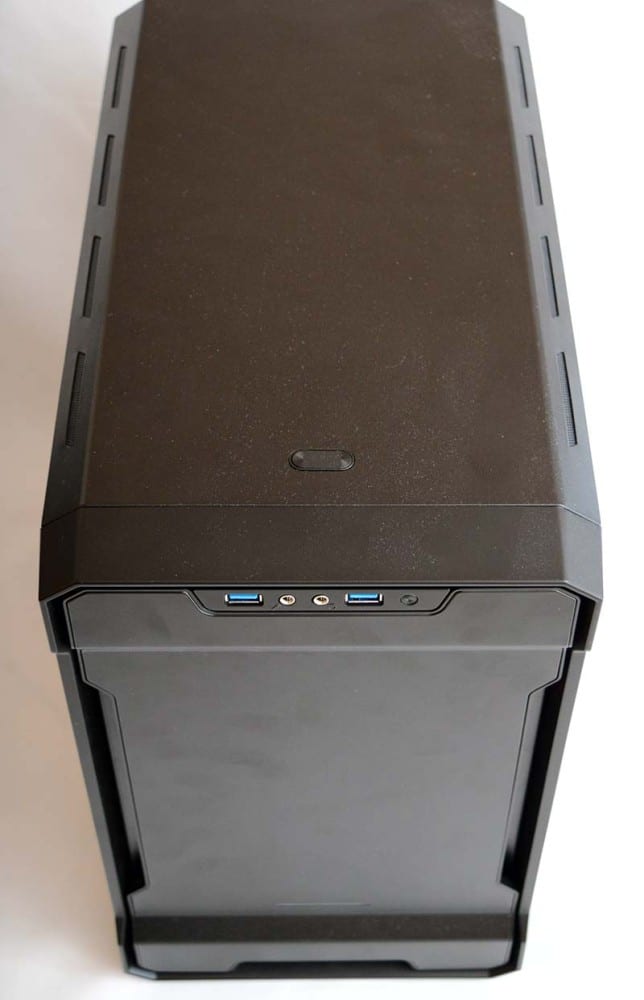
Four rectangular rubber feet are positioned on the bottom section to prevent the case from moving around and a dust filter is present underneath the power supply. Subsequently, it is quick and easy to wash the filter instead of cleaning the power supply directly with compressed air. This should also save you money in the long run.
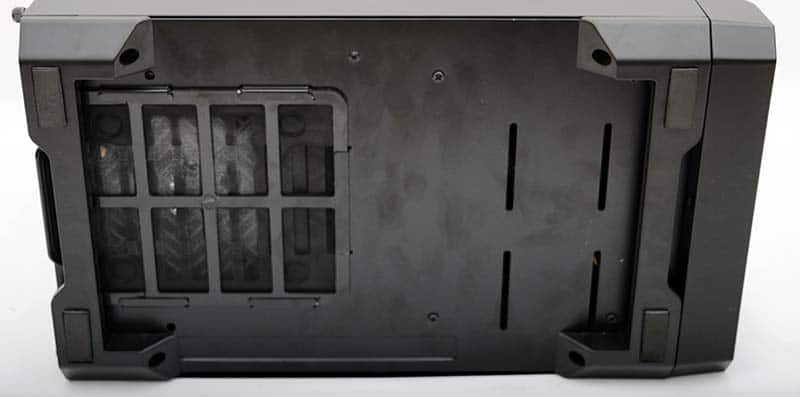
Here is a first look at the beautifully clean build which features expertly obscured cabling and a gorgeous black theme. As you can see, the power supply and its connectors are well hidden around the back and even the PCIe cables are difficult to spot. Additionally, the chassis’ ingenious use of cable covers dramatically improves the overall look and makes for a stunningly designed PC setup.

Unfortunately, when we move closer, there is an issue with the CPU power cable’s trailing connector. The MSI Z97I AC motherboard utilizes a 4 pin instead of the standard 8 pin design and hangs over the motherboard. To rectify this, I tried to hide the offending cable behind the radiator but this was too much of a stretch. Obviously, this isn’t an error in workmanship but can become quite irksome. However, once the windowed side panel is shut, it’s pretty difficult to notice.
This angle allows us to analyse the pump mount and graphics card installation. I’m pleased to say the closed loop cooler is connected with a flush finish and I didn’t detect any over-tightening of the mounting hardware. The graphics card is completely straight and didn’t exhibit any droop whatsoever. Overall, OCUK did a fantastic job in obscuring the pump, top and rear fan cables.
From an aesthetic standpoint, I’m quite pleased with how well the stealthy black RAM compliments the motherboard’s black accents and other vital components. This creates an understated yet attractive visual style which grows on you over time.
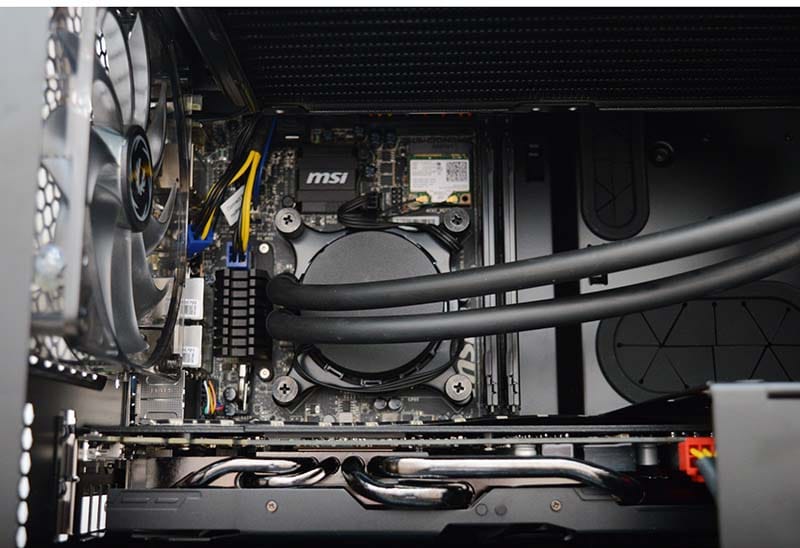
I have to commend OCUK for not skimping on the power supply selection and opting for one of the most reliable manufacturers in the industry. SuperFlower power supplies are legendarily reliable and often go way behind their official wattage range. During extreme testing, the unit was staggeringly quiet and didn’t encounter any problems with the manual overclock and wattage demands.
Although, as you might be able to tell from the picture, the case contained a line of dry PVA glue above the power supply. This was quite concerning at first, and I’m still fairly baffled by the root cause. The only plausible explanation I can think of is the glue came apart from the side panel window’s fixture. Whatever the case, it was easily removed and a very strange abnormality I wouldn’t expect to see ever again.
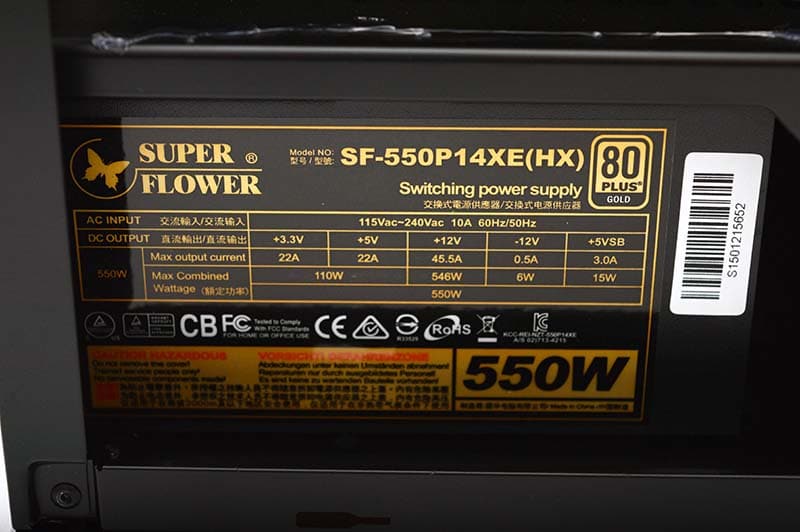
The front portion comes with an enormous 200mm fan as standard which offers superb airflow without impacting too heavily on the system’s audio levels. Here, we can also see how well the graphics card cover hides the PCIe cables. Other notable mentions include the case holes above the power supply to allow it room to breathe and a single LED strip. Interesting, OCUK decided to attach the strip to the graphics card’s backplate. This works extraordinarily well and feels a lot more solid than if it was stuck near chassis’ side panel clips.
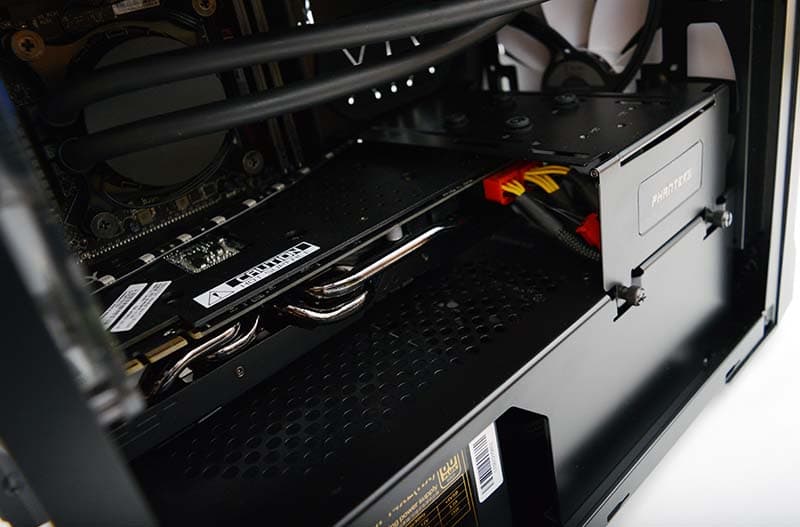
OCUK’s logo is very smart and one of the nicest I’ve seen from any custom PC manufacturer.

At first glance, the cabling looks quite messy and it’s definitely not the best I’ve seen. However, you have to take into account the chassis’ restricted space and ITX form factor. While there are a lot of cables overlapping, it still provides ample room to shut the side panel door effectively. Furthermore, OCUK combined the integrated Velcro straps and zip ties to create a respectful finish. The average end-user could struggle with cable management in tight spaces so this might be worth the price of admission alone to let someone else do the hard work.
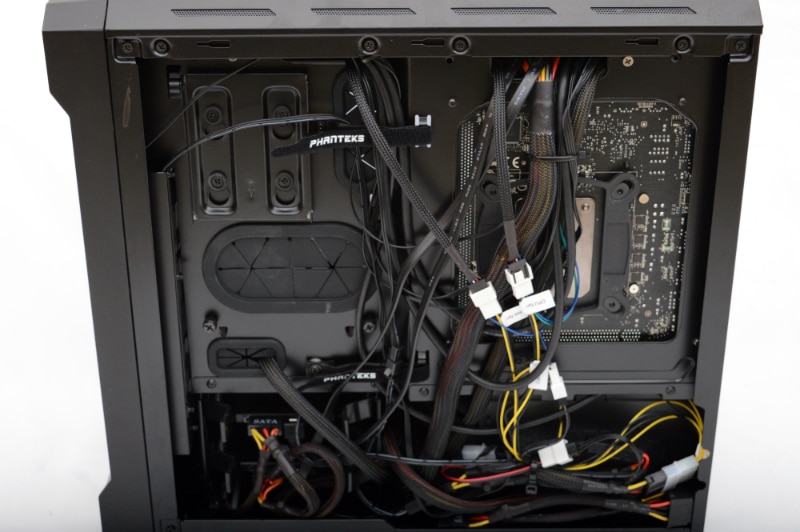
Upon closer inspection, we can see the labelled fan headers, main power supply cables and congestion around the CPU backplate. Frankly, the cabling is much better than it looks in this picture but could be improved.
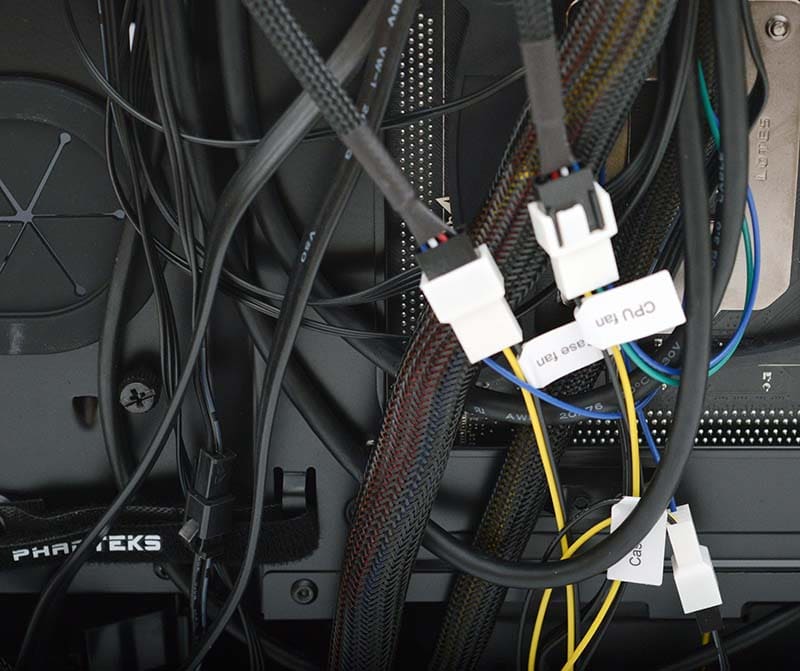
OCUK’s engineers crammed as many cables as possible into each zip tie to make for a better finish. This section is done quite well and demonstrates a high level of expertise.
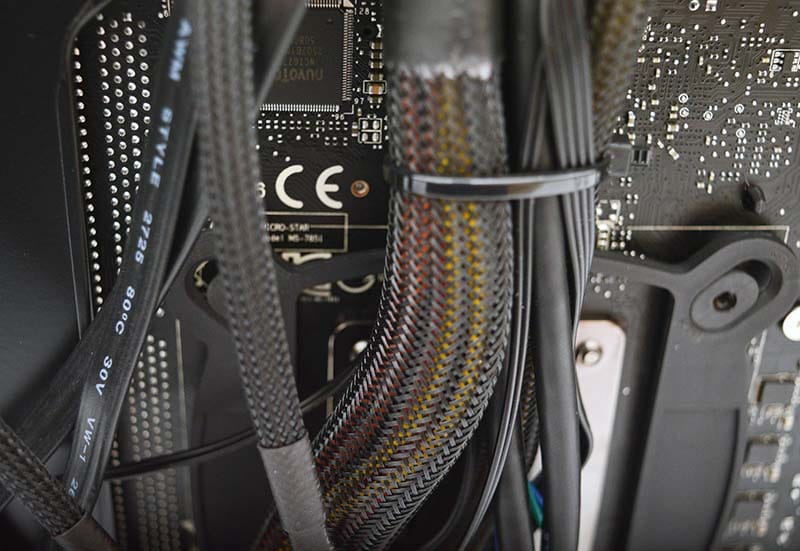
The molex and spare SATA power cables are stored in a compact manner and kept separate from other cable runs to make it easy to find a specific category of cabling.
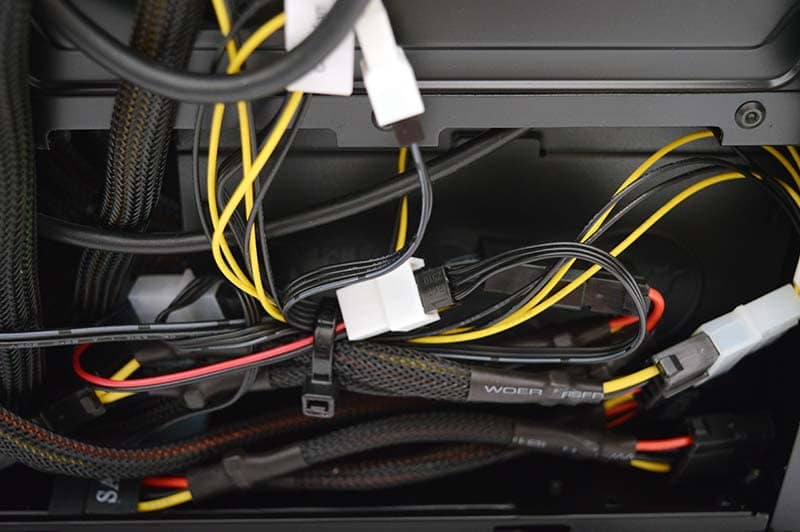
OCUK decided to ignore the chassis’ embedded SSD mounts and use traditional clip-on 3.5″ trays. This seems a sensible move given the cabling’s natural direction and copious supply of SATA power options near the traditional hard disk mounts.




















